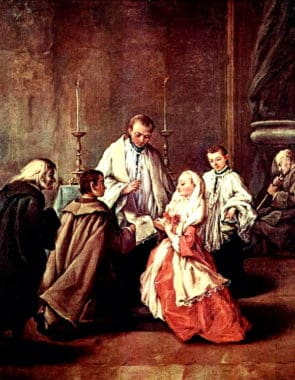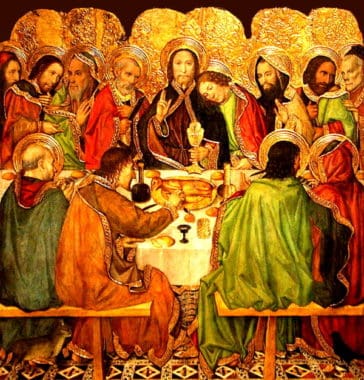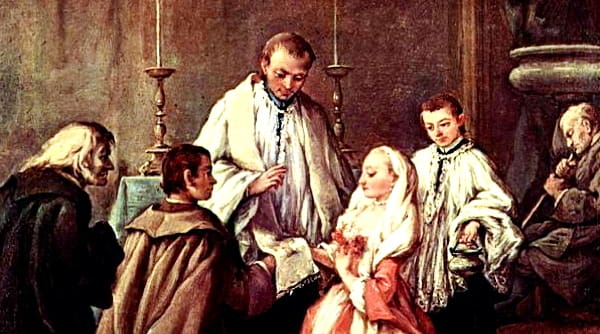Many of my friends’ children that insist they are Catholic got married in Episcopal, Lutheran (on a beach with uncle presiding) etc. type of ceremony. Are they still free to receive at Mass? Are they considered married in the Catholic Church? This is “no big deal” now a days? Would appreciate the Church’s view on this matter.
The situations you allude to are more complicated than you might think. Unfortunately, I can’t give a general answer that would clarify things for each case. But I can offer a few initial reflections that may help you navigate these treacherous waters. If you want to dig deeper into some of the implications, I can recommend a book by Jim Blackburn, Catholic apologist, called “101 Quick Questions with Catholic Answers: Marriage, Divorce, and Annulment.” If you want to reflect and pray about God’s vision for marriage, I can recommend an online, do-it-yourself retreat that I recently recorded called “Three Hearts: A Retreat Guide on the Sacrament of Marriage.” You can find it here: rcspirituality.org. Now, a few reflections about the cases you refer to.
Marriage Is Sacred
 We have to start by mentioning (we can only mention – we don’t have time or space to do more than that) some principles that form the background of the answer to your question. In the first place, marriage is something sacred. It was part of God’s original vision for human beings, for the meaning and flourishing of human life. A man and a woman giving themselves to each other unconditionally, completely, for their entire lifetimes is a mysterious and beautiful reality. It expresses our deepest calling as human beings: the calling to image and reflect here on earth the glory of God, the self-giving love of the Trinity. It also manifests, again in a mysterious way, the union of love between Christ and the Church. So you can see, marriage is not just a game or a preference or a nice lifestyle choice. It goes deeper. It is something sacred. Jesus actually elevated it to one of the seven sacraments – one of the seven sacred signs given to the Church by our Lord to grant us divine grace.
We have to start by mentioning (we can only mention – we don’t have time or space to do more than that) some principles that form the background of the answer to your question. In the first place, marriage is something sacred. It was part of God’s original vision for human beings, for the meaning and flourishing of human life. A man and a woman giving themselves to each other unconditionally, completely, for their entire lifetimes is a mysterious and beautiful reality. It expresses our deepest calling as human beings: the calling to image and reflect here on earth the glory of God, the self-giving love of the Trinity. It also manifests, again in a mysterious way, the union of love between Christ and the Church. So you can see, marriage is not just a game or a preference or a nice lifestyle choice. It goes deeper. It is something sacred. Jesus actually elevated it to one of the seven sacraments – one of the seven sacred signs given to the Church by our Lord to grant us divine grace.
Marriage Has a Community Dimension
Marriage is something that involves the spouses, but it also involves God and the wider community, since it affects the social fabric. Because of this, the sacrament of marriage always has a community dimension. It’s never just a private matter between two people who love each other. It connects those two people, but it also connects their families, and, if God wills, their children. And those families and children live within a wider network of interpersonal relationships – community, society, Church, state, etc… Even in non-Christian cultures, marriage has never been seen simply been a private reality; it has always been surrounded by rituals and traditions that show its intrinsic relation to the wider community.
Valid Marriages
As a result of these factors, and also as a result of wisdom gained from two thousand years of experience, the Catholic Church has learned to treat marriage with special care and respect. Also, we have come to  realize that certain characteristics need to be present for the sacred bond of marriage to actually be formed – free consent of the spouses, for example (i.e., if someone is forced to go through with a wedding but doesn’t want to, they don’t really enter into a valid marriage bond), and other things.
realize that certain characteristics need to be present for the sacred bond of marriage to actually be formed – free consent of the spouses, for example (i.e., if someone is forced to go through with a wedding but doesn’t want to, they don’t really enter into a valid marriage bond), and other things.
For Catholics who have not publicly and explicitly renounced their Catholic faith, one of these necessary characteristics is what theologians and canon lawyers call “proper form.” Respecting God’s vision for marriage, and respecting one’s own identity as a child of God through membership in his Church, requires us to approach and celebrate the sacrament of marriage in accordance with Church law. This law stipulates that a valid marriage needs to be witnessed by a Catholic pastor (usually a priest or deacon) and to take place in parish church. These requirements, and others that have to do with the religious identity of a non-Catholic spouse, can been dispensed with by the proper Church authority (usually the local bishop). But if a Catholic simply ignores these requirements and decides to treat marriage as nothing more than a private affair, ignoring its divine, ecclesial, and social dimensions, then the validity of the marriage bond itself can be brought into question.
Receiving Communion?
In such a case, a Catholic could put themselves in a position where they cannot worthily receive Holy Communion. In other words, a Catholic who knowingly  violated Church law in regards to marriage needs to repent and be reconciled before they can worthily receive the Eucharist. A Catholic who unknowingly violated Church law in regards to marriage, but later becomes aware of his or her irregular situation, also needs to meet with their pastor and seek to regularize the situation. The reason behind this is simple. When we receive the Holy Eucharist (in which Jesus himself is truly present, body, blood, soul, and divinity), we are saying “yes” to Jesus and to all that he has given and taught us in the Church. But we cannot honestly say “yes” to the Lord if we are consciously and intentionally also saying “no” to what he has revealed to us about the beautiful, mysterious, sacred reality of marriage.
violated Church law in regards to marriage needs to repent and be reconciled before they can worthily receive the Eucharist. A Catholic who unknowingly violated Church law in regards to marriage, but later becomes aware of his or her irregular situation, also needs to meet with their pastor and seek to regularize the situation. The reason behind this is simple. When we receive the Holy Eucharist (in which Jesus himself is truly present, body, blood, soul, and divinity), we are saying “yes” to Jesus and to all that he has given and taught us in the Church. But we cannot honestly say “yes” to the Lord if we are consciously and intentionally also saying “no” to what he has revealed to us about the beautiful, mysterious, sacred reality of marriage.
I hope these brief and only partial reflections have at least given you a little bit of light. I hope that in your conversations with people who find themselves in irregular situations you will be able to communicate, above all, the beauty of God’s vision for marriage, and the joy that comes from accepting God’s wise, grace-filled, and life-giving plan, even when it’s hard.
+
Art for this post on whether or not Catholics must marry in Catholic ceremonies: Das Ehesakrament (The Sacrament of Marriage), Pietro Longhi, circa 1755, PD-US author’s life plus 100 years or less, PD-Worldwide; Marriage Cross Christian Symbol, AnonMoos, 26 October 2010 own work, PD-Worldwide; modified Last Supper, Jaume Huguet, circa 1470, PD-US author’s life plus 100 years or less; all Wikimedia Commons.
Editor’s Note: For posts on marriage spirituality, see our marriage spirituality index here.





